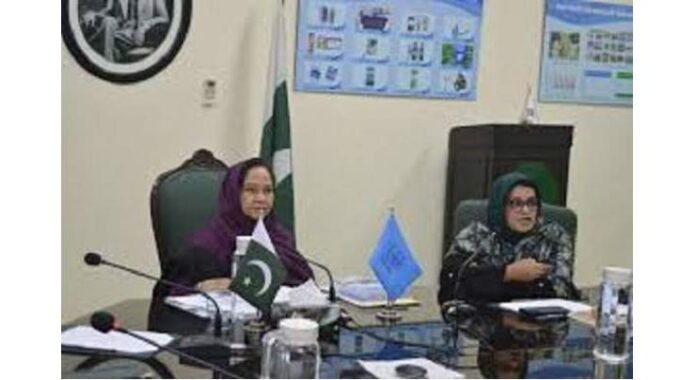- Advertisement -
ISLAMABAD, Apr 10 (APP):Director General Pakistan Council of Research in Water Resources (PCRWR) Dr Hifza Rasheed on Thursday said that collaborative project Climate Resilient Water Allocation Planning in Pakistan (CRWAPP) will enhance the efficiency of irrigation at farm level and provide valuable insights for policy makers, ultimately supporting small landholding farmers.
Speaking at a workshop here, she expressed confidence that the partnership will play a pivotal role in addressing water management challenges across the country. said a press release.
Dr Hifza Rasheed welcomed all project partners to the workshop. She highlighted the critical importance of Pakistan’s irrigation system amid growing challenges like groundwater depletion, population growth, rapid urbanization, and the impacts of climate change on water resources.
The workshop brought together key partners under the ACIAR project. Ms. Susan Cuddy from CSIRO, Australia provided the overview and objectives of the workshop.
She hoped that the workshop will provide an integrated water management approaches to interlink the system and local scale for effective water management.
Dr Mubin-ud-Din Ahmad, CSIRO provided an insightful overview of the project. He explained the project’s core aim of developing practical, science-based solutions to optimize water distribution under changing climatic conditions by highlighting the integration of surface and groundwater data.
He emphasized the project’s focus on improving irrigation efficiency and supporting smallholder farmers. He stressed that the outcomes will guide informed decision-making and contribute significantly to sustainable water resource management in Pakistan.
Mr Geoff, Hydrologist from Australia shared valuable lessons learnt from Australia’s experience in managing the Murray–Darling Basin, one of the world’s most complex river systems.
He highlighted the importance of data transparency, stakeholder engagement, and adaptive planning in achieving sustainable water use.
He further briefed how integrated water accounting and robust policy frameworks have helped balance agricultural needs with environmental sustainability offering practical insights that could inform water management strategies in Pakistan.
Mr Amjad Saeed, Member IRSA Punjab underscored the urgency of adopting integrated and data-driven approaches to manage Pakistan’s water resources amidst rising demand and climate challenges.
Emphasizing IRSA’s central role in system-scale water allocation, he highlighted the importance of collaboration among institutions to ensure equitable and efficient water distribution. The inaugural session followed by technical session where project partners shared their specific roles and upcoming activities under the ACIAR initiative.
Indus River System Authority (IRSA) presented its focus on system-scale water allocation planning to enhance national-level water distribution strategies. PCRWR highlighted its role in linking system-level insights with local-scale implementation.
University of Agriculture Faisalabad (UAF) emphasized the integration of socio-economic and gender considerations to ensure inclusive planning, while South Asian Conservation Agriculture Network (SACAN) outlined its work on community engagement and promoting efficient on-farm water management practices.
In the closing session of the workshop, the IRSA Member form Sindh Mr Ehsan Laghari expressed appreciation for the collaborative efforts under the ACIAR project and commended the initiative for addressing critical water challenges in Pakistan.
He emphasized the significance of evidence-based planning and the need for institutional coordination to ensure fair and efficient water allocation. He highlighted IRSA’s commitment to sustainable water governance, he noted that the knowledge shared during the workshop would play a vital role in shaping future water policies and supporting climate-resilient water management across the country.

